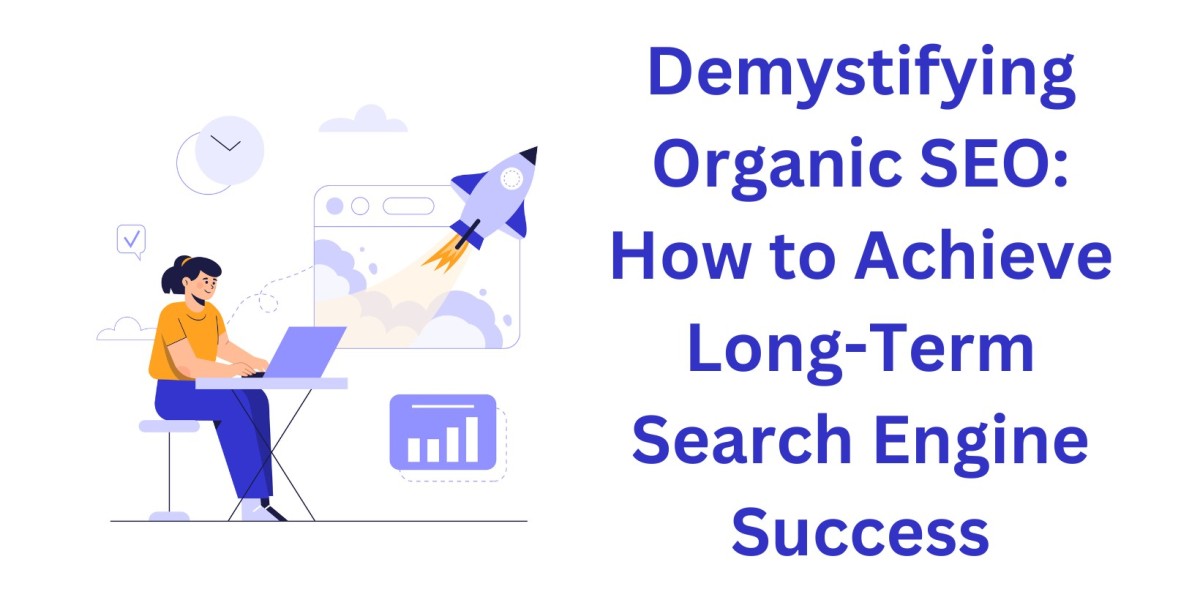In the digital marketing world, achieving long-term success in search engines often hinges on mastering organic SEO. But what exactly is organic SEO, and how can you leverage it for enduring results? This blog will explore the essentials of organic SEO, explain why it matters, and offer practical strategies to help you achieve lasting search engine success.
What is Organic SEO?
Organic SEO refers to the process of optimizing your website to rank higher in search engine results without using paid advertising. Unlike pay-per-click (PPC) campaigns, which require ongoing investment, organic SEO aims to improve your site's visibility through natural, unpaid methods.
The Basics of Search Engine Optimization
At its core, SEO involves enhancing various elements of your website to align with search engine algorithms. These algorithms determine which pages are most relevant to users' search queries. By optimizing your site, you can improve its chances of ranking higher in search results and attracting more organic traffic.
Why Organic SEO Matters
Understanding why organic SEO is crucial can help you appreciate its role in your digital strategy. Here are some key reasons:
Cost-Effective Marketing
One of the main advantages of organic SEO is its cost-effectiveness. Once your site starts ranking well, you can continue to attract traffic without additional costs. This is in contrast to paid advertising, where you pay for each click or impression.
Credibility and Trust
Users tend to trust organic search results more than paid ads. High rankings in search results often signal to users that your site is a credible and authoritative source of information. This trust can lead to higher click-through rates and increased conversions.
Sustainable Results
Organic SEO can provide long-term benefits. Unlike paid ads, which stop driving traffic when the budget runs out, organic SEO efforts can continue to deliver results long after initial implementation. Consistent optimization can help maintain and even improve your search rankings over time.
Key Components of Organic SEO
To achieve long-term success with organic SEO, focus on several crucial components. Each of these elements plays a vital role in improving your website's visibility and performance.
Keyword Research
Keyword research is the foundation of any effective SEO strategy. It involves identifying the words and phrases that potential customers use when searching for products or services related to your business.
Finding the Right Keywords
Use tools like Google Keyword Planner, SEMrush, or Ahrefs to find relevant keywords with a good balance of search volume and competition. Choose keywords that align with your business goals and target audience. Incorporate these keywords naturally into your content to enhance your chances of ranking well.
On-Page Optimization
On-page optimization refers to the changes you make on your website to improve its relevance and user experience. This includes various elements like content, meta tags, and headers.
Content Quality
Creating high-quality, engaging content is crucial for organic SEO. Your content should address the needs and interests of your target audience. Focus on providing valuable information that answers users' questions and solves their problems. Use your target keywords naturally within the content to help search engines understand its relevance.
Meta Tags and Headers
Meta tags, including meta titles and descriptions, provide search engines with information about your pages. Write compelling meta titles and descriptions that incorporate your keywords and accurately reflect the content of your pages. Headers (H1, H2, H3, etc.) help organize your content and make it easier for both users and search engines to navigate.
Technical SEO
Technical SEO involves optimizing the backend of your website to ensure it is accessible and understandable to search engines.
Site Speed
A fast-loading website is essential for both user experience and SEO. Slow-loading pages can frustrate users and lead to higher bounce rates. To improve site speed, optimize images, use caching, and minimize the use of heavy scripts.
Mobile-Friendliness
With the rise of mobile device usage, ensuring your website is mobile-friendly is critical. Google uses mobile-first indexing, which means it primarily considers the mobile version of your site for ranking. Make sure your site is responsive and provides a seamless experience on all devices.
Off-Page Optimization
Off-page optimization focuses on activities outside your website that can influence your search engine rankings.
Link Building
Building high-quality backlinks from reputable sites is a key component of off-page SEO. Backlinks serve as endorsements from other websites, indicating that your content is valuable and trustworthy. Focus on acquiring backlinks from relevant and authoritative sources.
Social Media
While social signals do not directly impact search rankings, a strong social media presence can support your SEO efforts. Engaging with your audience on social platforms can drive traffic to your site and increase brand visibility.
Implementing a Successful Organic SEO Strategy
To achieve long-term search engine success, implement a comprehensive organic SEO strategy that includes the following steps:
Develop a Content Plan
Create a content plan that outlines the topics, keywords, and publishing schedule for your site. Regularly update your blog with fresh, relevant content to keep your audience engaged and attract new visitors. Consistent content creation can help improve your search rankings over time.
Optimize for User Experience
A positive user experience is essential for SEO. Ensure your site is easy to navigate, visually appealing, and provides valuable information. Address any issues that may affect user experience, such as broken links or slow loading times. A well-designed site can encourage users to stay longer and explore more pages.
Monitor and Analyze Performance
Regularly monitor your SEO performance using tools like Google Analytics and Google Search Console. Track key metrics such as organic traffic, keyword rankings, and conversion rates. Use this data to assess the effectiveness of your SEO efforts and make necessary adjustments.
Stay Updated with SEO Trends
SEO is an ever-evolving field, and staying updated with the latest trends and algorithm changes is crucial. Follow industry blogs, attend webinars, and participate in forums to stay informed about new developments. Adapting to these changes can help you maintain and improve your search rankings.
Common Mistakes to Avoid in Organic SEO
To maximize the effectiveness of your organic SEO efforts, avoid common pitfalls that can hinder your progress.
Keyword Stuffing
Keyword stuffing, or overusing keywords in your content, can negatively impact your SEO. Search engines may penalize sites that engage in this practice, and it can lead to a poor user experience. Instead, use keywords naturally and contextually within your content.
Ignoring Technical Issues
Technical issues, such as broken links or crawl errors, can affect your site's search rankings. Regularly audit your site for technical problems and address them promptly. Ensuring that your site is technically sound is essential for maintaining good search visibility.
Neglecting Local SEO
If your business serves a local audience, neglecting local SEO can limit your visibility in local search results. Optimize your site for local searches by including location-based keywords, creating a Google My Business profile, and encouraging customer reviews.
The Future of Organic SEO
As search engines and user behaviors evolve, staying ahead of future trends can help you maintain a competitive edge. Here are some trends to watch in the coming years:
Voice Search Optimization
With the growing use of voice-activated devices, optimizing for voice search is becoming increasingly important. Focus on natural language and conversational keywords to address voice search queries effectively.
Artificial Intelligence and Machine Learning
Artificial intelligence and machine learning are playing a larger role in SEO. Search engines use AI to better understand user intent and deliver more relevant results. Stay informed about these technologies and adapt your SEO strategies accordingly.
User Experience (UX) Signals
User experience signals, such as site speed, mobile-friendliness, and engagement metrics, are becoming more important for SEO. Prioritize UX to improve your search rankings and provide a better experience for your visitors.
Conclusion
Organic SEO is a powerful and cost-effective strategy for achieving long-term success in search engine rankings. By understanding its key components and implementing effective practices, you can enhance your website’s visibility, attract more organic traffic, and drive sustained growth. For a deeper dive into organic SEO and further insights, you can read more about what is organic SEO in our full-fledged blog. Embracing organic SEO will not only improve your search engine visibility but also contribute to the overall success of your digital strategy.








